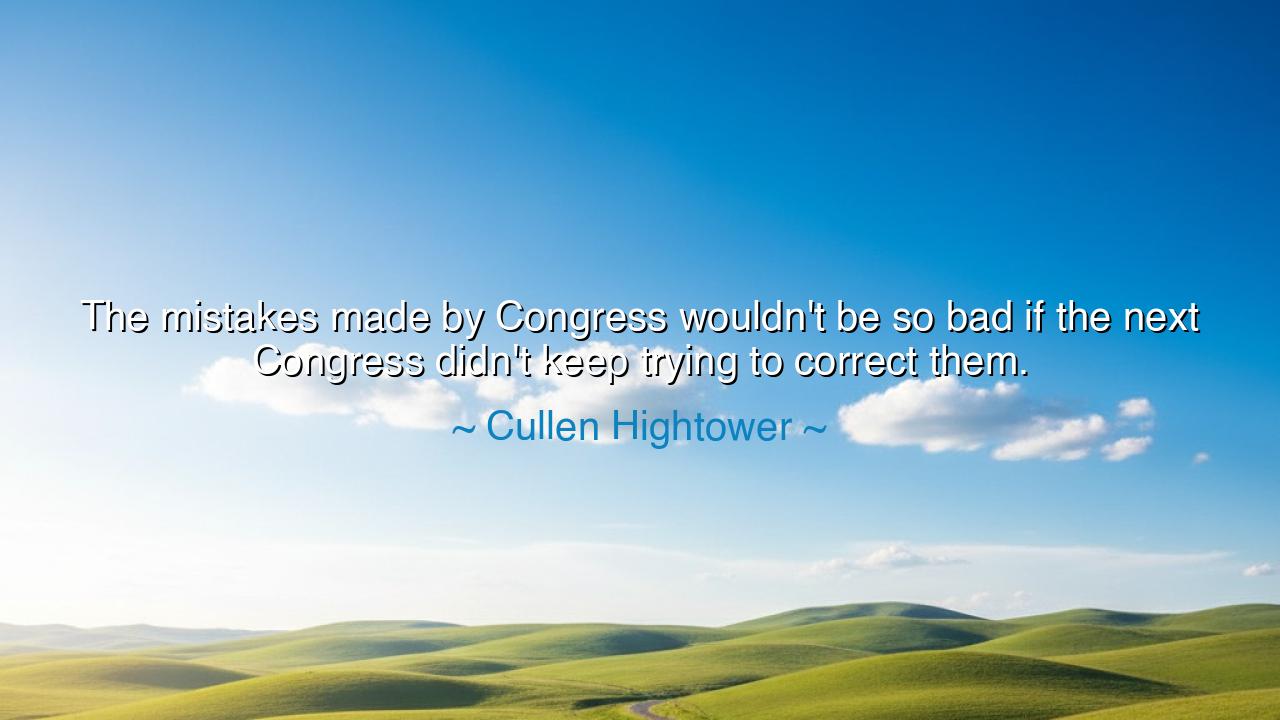
The mistakes made by Congress wouldn't be so bad if the next
The mistakes made by Congress wouldn't be so bad if the next Congress didn't keep trying to correct them.






When Cullen Hightower wrote, “The mistakes made by Congress wouldn’t be so bad if the next Congress didn’t keep trying to correct them,” he offered not merely a witticism, but a profound reflection on the cyclical folly of governance — the endless chain of human error disguised as reform. His words, wrapped in humor, strike at the very heart of politics: that those who rule often compound error with zeal, mistaking motion for progress, and noise for wisdom. Beneath the laughter his quote invites lies an ancient warning — that without humility and reflection, the attempt to repair the flaws of yesterday often forges new flaws for tomorrow.
The origin of this quote rests in Hightower’s gift for distilling political insight into sharp, memorable truths. A modern American humorist known for his concise aphorisms, he wrote in the latter half of the 20th century, observing the ever-turning wheel of legislative ambition. Each new Congress, eager to prove itself wiser than the last, passed laws meant to fix what their predecessors had broken — and in so doing, frequently built new layers of complexity, contradiction, and confusion. Hightower’s remark captures this tragic rhythm: the pride of power perpetuating error through the illusion of correction. It is a reflection not of malice, but of human impatience — the refusal to learn slowly, the compulsion to act before understanding.
His words recall the ancient pattern that philosophers from Aristotle to Cicero lamented: that governments, in their effort to govern better, often govern worse. The ancients understood that wisdom in rule depends less on bold reform than on the restraint to observe the consequences of one’s own deeds. Yet history, ever forgetful, repeats itself. The “next Congress,” in every age, becomes a metaphor for all those who inherit a flawed system and believe that quick action will save it. But, as Hightower teaches, when each generation legislates from pride rather than prudence, nations drift into chaos not through tyranny, but through restless meddling.
Consider a story from history: the French Revolution. Born from noble intentions — liberty, equality, fraternity — it began by correcting the injustices of monarchy. But soon each new assembly sought to “fix” the excesses of the one before it. The revolution that began with cries for freedom spiraled into terror, then tyranny. Each new government promised correction; each left deeper wounds. What began as reform became ruin. The cycle Hightower described played out on a grand scale: a nation consumed by its own attempts to repair itself too quickly. The wisdom that might have preserved balance was lost to the fever of endless correction.
Hightower’s humor, then, is a mirror for a grave truth: that governments fail not only by doing wrong, but by refusing to pause and learn from what they have already done. The instinct to “fix” every problem at once is not the mark of wisdom but of insecurity. True governance — like true craftsmanship — requires patience, observation, and humility. The craftsman does not strike the metal twice before seeing what the first blow has wrought; nor should lawmakers pass judgment before time has revealed the fruits of their labor. But in every age, pride hastens the hand, and reformers become the authors of the very problems they condemn.
Yet, Hightower’s insight extends beyond politics; it is a mirror for life itself. How often do individuals, in their own affairs, rush to correct their mistakes without first understanding them? The parent who disciplines too harshly, then spoils in guilt; the leader who overcompensates for one failure with another; the soul that seeks redemption through haste instead of reflection. In all these, the same law applies: impatience breeds repetition. The true correction of error lies not in action alone, but in contemplation — in the courage to wait, to learn, and to grow wiser before acting again.
The lesson of Hightower’s words is therefore one of restraint and discernment. Wisdom does not fear stillness; folly cannot endure it. Whether in government, in business, or in the governance of one’s own heart, haste in correction can be as ruinous as the mistake itself. Let those who lead — and those who live — remember this: not every wound demands immediate stitching, and not every wrong requires instant remedy. Time, truth, and reflection are the healers of both nations and souls.
So let this teaching be passed down: learn first, act later; understand deeply before correcting boldly. For the world has no shortage of reformers — only a shortage of the wise. The best leaders are not those who undo the deeds of others, but those who listen, discern, and act with patience born of humility. In this balance lies the enduring art of good governance — and the timeless cure for the folly of “the next Congress” that forever seeks to fix what it does not yet understand.






AAdministratorAdministrator
Welcome, honored guests. Please leave a comment, we will respond soon